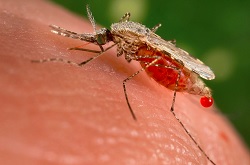 |
Although GlaxoSmithKline ($GSK) has submitted its malaria vaccine to the European Medicines Agency for approval, the jab hasn't shown as much promise as hoped, underscoring the need for a better understanding of the malaria parasite and how it affects the human immune system.
By studying just that, scientists from the Wellcome Trust Sanger Institute and Kenya Medical Research Institute have revealed new antigens that had not previously been identified as vaccine targets.
The findings, which were published July 30 in Science Translational Medicine, represent a notable advance for the field, which has seen few new antigens added to the malaria vaccine candidate arsenal in recent years.
Researchers followed a group of children infected with the malaria-causing parasite Plasmodium falciparum for 6 months and observed that some patients became sick, but others seemed to be protected against developing symptoms by naturally occurring antibodies.
The team tested antibodies produced by the children's immune systems against a library of proteins from the malaria parasite to identify combinations of antibodies that could provide up to 100% protection against infection.
"Resistance to malaria drugs is an increasing problem so vaccines are desperately needed to battle the Plasmodium falciparum parasite before it has a chance to make people sick," Dr. Faith Osier, first author from the Kenya Medical Research Institute, said in a statement. "This study presents us with a large number of new vaccine candidates that offer real hope for the future."
Investigators found that the naturally occurring antibodies kept some patients free of malaria infection by that stopping the malaria parasite from penetrating their red blood cells during the blood stage of the disease, which causes symptoms like fever and anemia.
The relentless quest toward developing a malaria vaccine has not been easy, due to the constantly changing nature of the malaria parasite.
Even Glaxo's malaria vaccine, which has emerged as the world's leading candidate in the space, posted weaker-than-hoped-for prevention numbers and has shown waning immunity.
- read the press release from the Sanger Institute
- see the study abstract